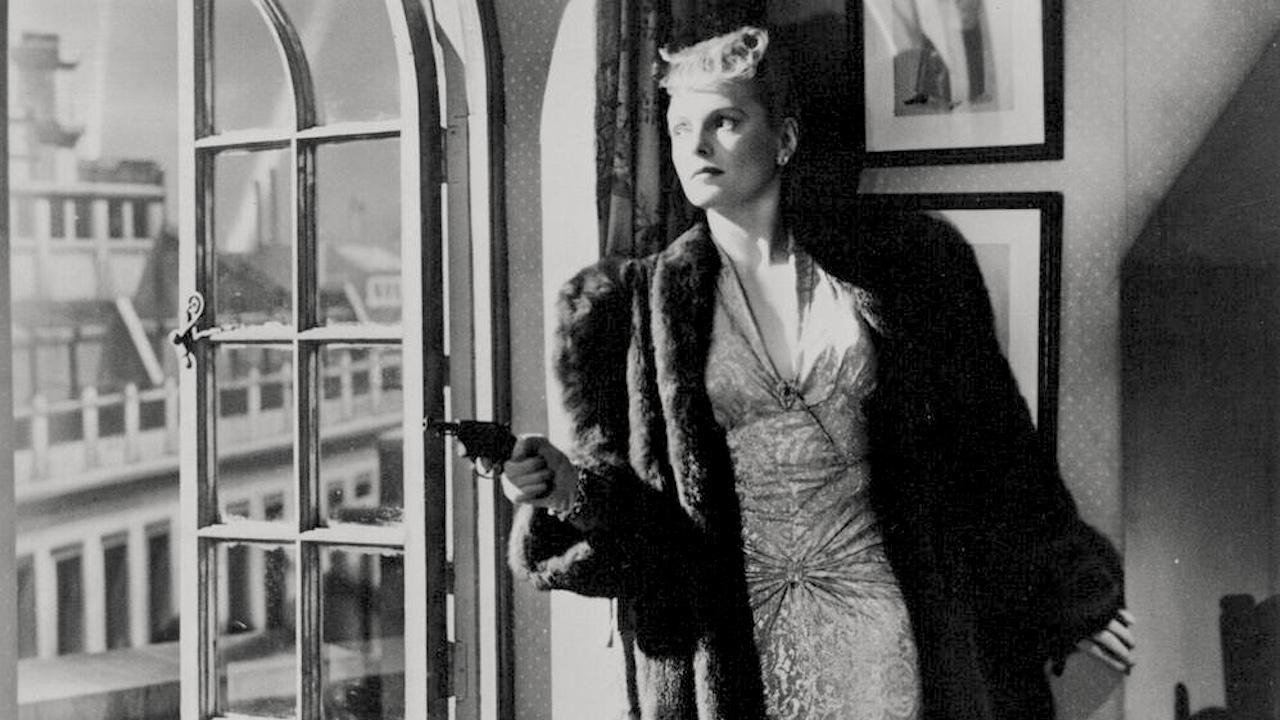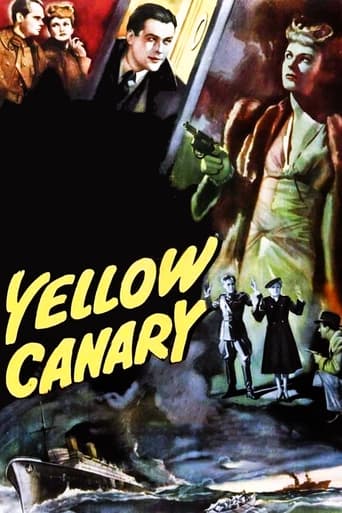

Love a good spy picture, especially those involving double agents and counter spies, and this is one of them. Richard Greene is at his most appealing as a pesty passenger/spy and Anna Neagle is a Nazi sympathizer/ counter spy who meets a Polish national onboard a ship to Halifax who is actually a Nazi operative. Great stuff when you put it all together and add a sinister Nazi espionage plan (is there any other kind of Nazi plan?).Richard Greene is essential to the main plot, and don't go to the fridge during the passage to Halifax or you will miss a clever bit of deception involving Greene's character, as well as scenes with Margaret Rutherford, who is as delightful as always. "Yellow Canary" is well worth spending the 85 minutes running time. It is entertaining and contains the necessary moments of suspense and excitement that make movie-going so worthwhile.
... View MoreYELLOW CANARY is a standard WW2 espionage film that paints the Nazis in the blackest of colours, as you'd expect from a movie made contemporaneous with the war itself. The usual propaganda elements of the genre are present and correct, and the tale as told is simple too, although rather simplistic for its type. There's not really too much depth to the story which means that it does feel like this drags in places.The film's protagonist is none other than Anna Neagle, once one of our country's most popular starlets, although she's long forgotten today. Her German background sees her driven out of Britain as a Nazi sympathiser, so she decides to start a new life in Nova Scotia. On board the ship she hooks up with two male passengers, one a rich aristocrat from Poland and the other a stiff-upper-lip British officer played by the reliable Richard Greene.The rest of the tale plays out as expected with hidden identities, shifts of allegiance, and a mystery angle as the viewer has to work out if any of the leads are hidden Nazi sympathisers or not. There's some peril here towards the climax which is reasonably done and the acting is solid enough for the genre. It's just a film that I found a little plodding at times.
... View MoreThis film was ultimately something of a disappointment, declining in its final moments into a standard wartime flag-waver. This is a pity, because for much of its length it is effectively scripted, intriguing, and well-directed. I get the feeling that, having set up a complex premise with considerable skill, no-one was quite able to come up with any idea what to do with it.As befits a film about espionage and counter-espionage, most of the running length is spent in establishing exactly what is going on. The casting of Anna Neagle is in some respects a drawback in this -- there's nothing wrong with her performance, it's simply that it is unthinkable in a Wilcox/Neagle picture that England's Anna can ever really be on the 'wrong' side. The intended twist revealing her to be a double agent isn't quite so much of a surprise as it could be, and there can be no further ambiguity in her loyalties however suspiciously she behaves. That said, however, while I was assuming at the start that something more had to be going on than was evident, it's a tribute to Miss Neagle's acting that by the mid-point of the film I was beginning seriously to doubt my assumptions, and wonder if the requisite 'happy' ending would instead be provided by the character's last-minute conversion and sacrifice to foil the Fuehrer's plans! The picture starts as it goes on, elliptically and intelligently, by delineating in economical strokes what turn out to be two entirely irrelevant minor characters as a means to set the time and place: London, in a bombing raid. Our hard-eyed heroine is introduced in the first of many suspicious circumstances -- apparently signalling to German aircraft from a room in which a man's death has been made to look like suicide. We learn that she is unwelcome in polite Society before we learn, via a series of snippets, why -- in a wartime England, she alone refuses to condemn the Germans.Sally Maitland is a Unity-Mitford-like figure, but one endowed with a family of ardent patriots: the film is well-enough done to create an unlikely empathy for her point of view. After all, she has actually been to Germany, speaks the language fluently, and lived among its people; she is a proud girl, and most of those she is dealing with know nothing whatsoever about the country for which they express such hate. It's an uncomfortable shift of perception for the viewer, worthy of that profoundly English outsider, Emeric Pressburger.But Sally is not merely anti-war -- she makes a parade of being pro-Nazi, out to betray ship positions, sabotage the blackout, etc. It was at this point that I began to suspect the film of propaganda; surely a real Nazi agent wouldn't openly court suspicion, but would do her best in public to blend in? Yet she pointedly attaches herself to a Polish refugee officer, a member of the despised Slav races. On his side it is perhaps, as he says, chivalry for a girl with the courage to stand openly against the prevailing wind, but for a loyal Nazi, this is strange behaviour.So when, in Canada, 'Jan' finally draws out a cigarette-case with an emblazoned swastika, everything for me became suddenly very clear. It is at this moment, and not via the subsequent dialogue with the British Intelligence officer, that the true 'reveal' takes place; it is at this moment that we understand why she has been proclaiming herself as she has. Sally Maitland is indeed too blatant to be true. She has been sent to Canada as bait, to lure out a suspected Nazi network.From this point the film becomes a double-agent thriller, more concerned with ingenious mechanics than psychological tension, and inevitably becomes a little formulaic. It's still a pretty taut ride, with a few explanations yet to be tied in -- what exactly was she up to during that air-raid, for example? -- before the end.Unfortunately at the intended climax it does fall down rather, from the grand revelation of the Nazi mastermind's identity onwards. The best thing that resourceful Sally can think of to pass her message is to break cover and shout it down the telephone with the lights switched off, whereupon her brand new beau appears almost instantaneously (just how far is it from Mountie HQ?) to hold up the crooks single-handed. The convoy is rapidly rescued by pinpoint bombing despite zero visibility, and the supposedly shot-dead Sally is saved on the operating table. (Although some explanation is at least provided for this, in the form of the fatal cigarette case that stopped the bullet -- not at all clear on the small screen.) And the family reunion, with its obligatory gung-ho jollity, I found fairly cringe-making in contrast to the poised intelligence of what had gone before. The original pitch for the film was presumably 'Upperclass Nazi ultimately revealed as double agent': beyond that point, inspiration seems to have been somewhat lacking.For most of its length, however, "Yellow Canary" (the title referring to the heroine's supposed cowardice) is actually a pretty good picture. Anna Neagle gives an excellent performance as ice-cold Sally -- although she is less convincing in her 'reform' to a gushing, bumptious creature at the end -- and there are fascinating moments when you can watch her switch on a character in her double-agent role more or less at the drop of a hat. Margaret Rutherford has a priceless cameo as the sort of ultra-patriotic Englishwoman whose careless talk costs lives, and a young Richard Greene (of "Robin Hood" fame) demonstrates no mean acting ability himself, as his Intelligence commander switches between suave hero and the pose of silly-ass man about town. The intelligent script owes a good deal to writers Miles Malleson (character actor with scripts from "Nell Gwyn" to the Kordas' "Thief of Baghdad" to his credit) and DeWitt Bodeen (of the offbeat "Cat People").
... View MoreBritish, made in 1943, which tells you the ideological basis of the film.It's a well-worked story of deception and counter-deception, mostly set in Halifax, NS. Evil Nazi agents and heroic British agents, with Richard Greene looking handsomer than ever in the van, mount operations against each other. Anna Neagle plays a double agent, which means she has to act acting, a test of ability which she carries off very well.Margaret Rutherford has a stormer of a cameo role, shamelessly stealing every scene she's in. Her line "Wouldn't it be nice to do something violent?" is a classic.Well above average example of routine genre.
... View More